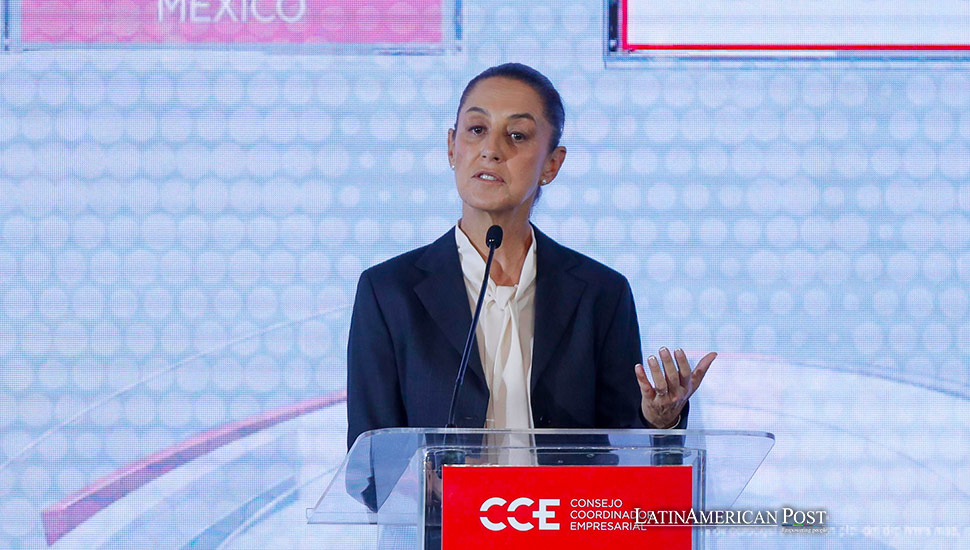Sheinbaum’s Judicial Reform Sparks Debate and Market Reactions in Mexico

As Claudia Sheinbaum prepares to become Mexico’s next president, she faces scrutiny and concern from the business community over her proposed judicial reform, which critics fear could undermine the country’s system of checks and balances.
Claudia Sheinbaum, poised to become Mexico’s next president, reassured leading business organizations on Wednesday that her administration does not seek absolute power amidst uncertainty stirred by her controversial judicial reform, which is seen as a potential threat to the nation’s checks and balances. However, the reform has also faced criticism for potentially concentrating more power in the executive branch and undermining the system of checks and balances.
In her first meeting with the private sector since her electoral victory on June 2, Sheinbaum sought to allay fears about the intentions behind the judicial reform. “This judicial reform will not represent authoritarianism or a concentration of power. That is not the objective,” Sheinbaum stated firmly.
The ruling party’s victory, which will have a supermajority in Congress from September 1, has alarmed markets, seeing it as a step towards weakening the checks and balances in Mexico. This supermajority, which means the ruling party has more than two-thirds of the seats in Congress, would enable constitutional reforms without the need for opposition negotiation. The day after the election, the Mexican Stock Exchange (BMV) plummeted by over 6%, and the Mexican peso depreciated by 4.4% against the dollar, with neither having fully recovered since.
However, Sheinbaum argued that the reform, which aims to elect judicial members through popular vote, would grant judges, magistrates, and ministers greater autonomy. This reform, if implemented, could lead to a more democratic and transparent judicial system, as the judges would be directly accountable to the public. “The goal is for the judiciary to have more autonomy and the ability to truly represent a judicial power that seeks justice alongside the prosecutors in cases where prosecutors are involved,” she elaborated.
Economic Repercussions and Market Reactions
The president-elect, who garnered the highest number of votes in Mexico’s history—nearly 36 million—emphasized the importance of respecting the majority’s will expressed in the June 2 election. She reassured me this would not preclude dialogue or signify a concentration of power.
Sheinbaum, who served as the head of government for Mexico City from 2018 to 2023, affirmed that the dialogue process with all stakeholders remains open. The Congress has already set up a series of ‘open parliament’ exercises to discuss the judicial reform, among other contentious legal changes that the ruling party intends to pass starting September 1, one month before Sheinbaum assumes office on October 1.
Marcelo Ebrard, the former Foreign Minister (2018-2023) and now part of Sheinbaum’s transition team, hinted on Tuesday during a meeting with legislators that “minimal changes” could be made to the controversial legal system reform following these dialogues.
Latin American Context and Historical Perspective
Sheinbaum’s proposed reforms come when Latin America is witnessing significant political shifts. In recent years, countries like Venezuela and Nicaragua have seen their judicial systems criticized for lack of independence and transparency, contributing to international concerns about democratic backsliding in the region. These concerns have led to increased scrutiny of judicial reforms in the region, including Sheinbaum’s proposed reform in Mexico.
With its complex political history, Mexico has often navigated a delicate balance between reform and maintaining democratic principles. The proposed judicial reform could redefine this balance, potentially setting a precedent for other Latin American nations grappling with similar judicial autonomy and executive power issues.
The business community’s reaction underscores a broader apprehension about economic stability and governance. Investors fear that the reforms could compromise judicial independence, affecting the rule of law and, subsequently, the business climate. Such concerns are not unfounded in a region where political decisions have historically had profound economic repercussions. For instance, if the reform leads to a perceived lack of judicial independence, it could deter foreign investment and slow down economic growth.
Despite the apprehensions, Sheinbaum’s insistence on open dialogue with all sectors offers hope. Her administration’s commitment to consider adjustments to the reform based on parliamentary discussions indicates a flexible approach, potentially mitigating some of the fears surrounding her proposed changes and reinforcing the importance of democratic decision-making.
Moreover, Sheinbaum’s overwhelming electoral mandate suggests broad public support for her vision, reflecting a desire to change how judicial appointments and autonomy are handled in Mexico. This public mandate could be a double-edged sword, giving her the legitimacy to push forward with her reforms while holding her accountable to ensure these changes do not undermine democratic institutions. The reform, if implemented, could lead to a more democratic and transparent judicial system, as the judges would be directly accountable to the public. However, it could also concentrate more power in the executive branch, potentially undermining the system of checks and balances.
Sheinbaum’s Commitment to Dialogue
As Mexico stands at this crossroads, the international community, including significant trade partners and regional allies, will closely monitor the developments. The outcome of this judicial reform could either bolster Mexico’s democratic credentials or signal a shift towards more centralized power, affecting its standing on the global stage. For instance, the United States, Mexico’s largest trading partner, has expressed concerns about the potential impact of the reform on the country’s business climate.
Also read: Technology and Public Health Needed to Combat Growing Dengue Threat in Brazil and Mexico
In conclusion, Claudia Sheinbaum’s presidency promises significant changes, particularly in the judicial sector. While her assurances of not seeking absolute power aim to quell fears, the implementation of her reforms and the resulting economic and political impacts will be the test of her administration’s commitment to democratic principles and judicial autonomy. The upcoming dialogues and legislative sessions will be critical in shaping the future of Mexico’s judiciary and, by extension, its democracy.





